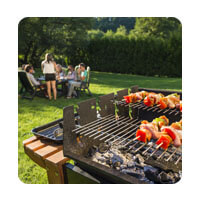 Safety Makes Your Summer Party Memorable—In the Right Way
Safety Makes Your Summer Party Memorable—In the Right Way
Summer is truly party time in America between friends and family. But homeowners should be aware of the risks associated with these get-togethers. Before reviewing safety tips, let’s look at three common risks for which a homeowner might need insurance coverage:
Liquor liability: Most homeowners know that they bear some responsibility if a party guest becomes impaired after consuming alcoholic drinks at the homeowner’s house, and then drives, causing a car accident. If the party-giver is sued, however, his/her homeowners and automobile insurance policies may not provide liability coverage. (Keep in mind that the legal defense against a claim is another significant expense for anyone who is sued in such a circumstance.) Changes to homeowners insurance standard contracts over a decade ago may limit the coverage available under a homeowners policy. Homeowners might be well served to check their homeowners and auto insurance policies (contacting their agent, if necessary) to determine what protection they may have.
Personal accidents on the homeowner’s property: A homeowners policy and an excess liability policy (dubbed an “umbrella” policy) provide broad protection for accidents on the party host’s property. For instance, if a guest tumbles down the steps of an outdoor deck or a child is burned by the outdoor grill, the homeowners policy would pay medical costs for the guest (and, should a lawsuit follow, likely would pay the costs of defending against the lawsuit and any subsequent damages awarded in the case). No one, of course, wants to see such events occur, but accidents can and do happen. Homeowners coverage is designed to “make whole” a homeowner who is facing a liability claim due to an accident on his or her property.
Property damage liability: When guests drive to your party and park their cars at your home, the homeowner assumes risk. The possibilities of property damage range from a simple dent from a stray baseball, to a young driver releasing the parking brake and rolling the car into a tree. A different example of property damage is the theft of a guest’s purse/wallet or valuable articles from the party-giver’s property. Homeowners coverage pays for damage to another person’s property, if the homeowner is held liable. A homeowner’s negligence and omissions (i.e., failing to take steps that might have prevented an incident) are reasons that he or she can be found liable for damage to another person’s property.
To prevent accidents, consider some sensible safety precautions: Grilling Some 5,000 people are injured by charcoal, wood-burning and propane grill fires each year, according to the U.S. Fire Administration of the Federal Emergency Management Administration. Good safety practices include:
- Before using a propane gas grill, check the connection between the tank and the fuel line. Make sure the Venturi tubes (where the air and gas mix) are not blocked, and check hoses for cracks or damage.
- Never use a propane barbecue grill on a balcony, terrace or roof. And never grill/barbecue in enclosed areas, as deadly carbon monoxide can be produced.
- Keep a fire extinguisher or a source of water (a garden hose or four-gallon pail of water) near an outdoor grill or barbecue.
- While barbecuing, don’t wear loose clothing. Use long-handled barbecue tools and/or mitts that are flame resistant.
- Don’t squirt flammable liquids onto an open flame.
- Don’t leave a grill unattended.
- Keep matches and lighters away from children. Supervise children around outdoor grills, which are objects of curiosity.
- If using a charcoal or wood fire, dispose of hot coals properly by soaking them with water, then stirring to ensure that fire is extinguished. Never place them in plastic, paper or wooden containers.
- Keep alcoholic beverages away from the grill since they are flammable.
Drinking Liquids containing alcohol cause the human body to lose more fluid, say health educators. So summertime drinking in the sun or heat can present hazards to health, including impaired judgment, balance and coordination. Consider these safety tips if serving:
- Use designated drivers.
- Make non-alcoholic beverages as available as alcoholic drinks.
- Stop serving alcohol well before the party ends.
- If children are attending the event, remember that alcohol may seem more available to them at a party.
Dining Outdoors Food-borne illnesses favor the hot conditions found at outdoor events where food is not refrigerated or may be undercooked. The U.S. Department of Agriculture offers food safety tips:
- Cook foods thoroughly to safe minimum internal temperatures.
- Keep hot foods hot and cold foods cold. Hot foods should be heated and maintained at 140 °F or warmer. Cold foods should be held at 40 °F or colder. Maintain cold by placing food dishes in bowls of ice or in a cooler.
- Live by the “two-hour rule”: Foods should not sit at room temperature for more than two hours.
Everyone likes a great summer party, especially when they’re safe. As always, if you have questions or desire more information about homeowners insurance and umbrella coverage simply contact us… you local independent insurance agent.